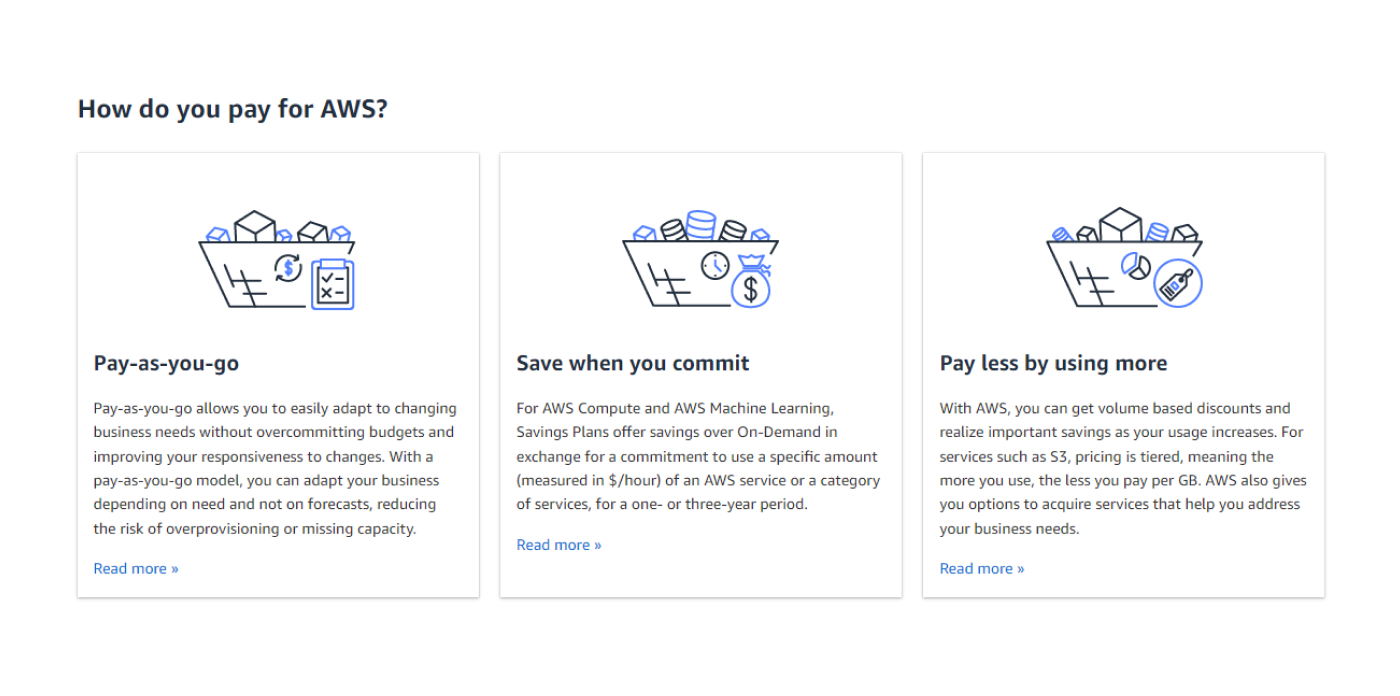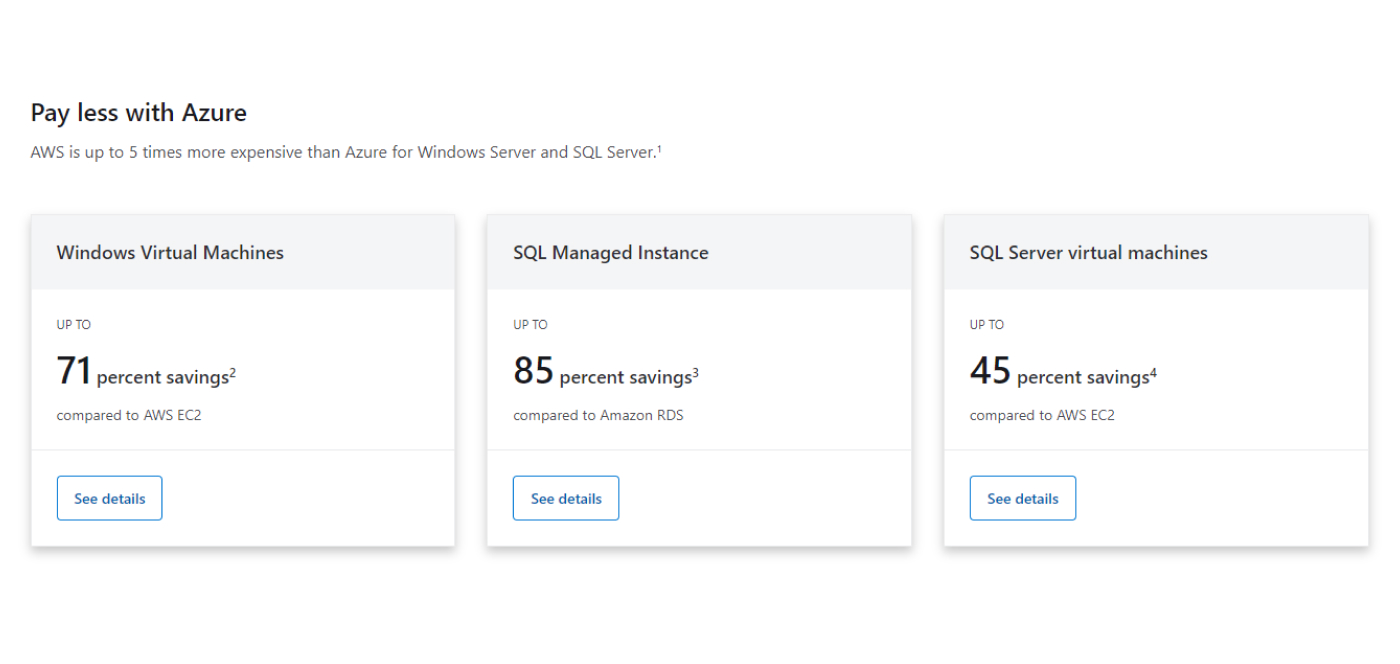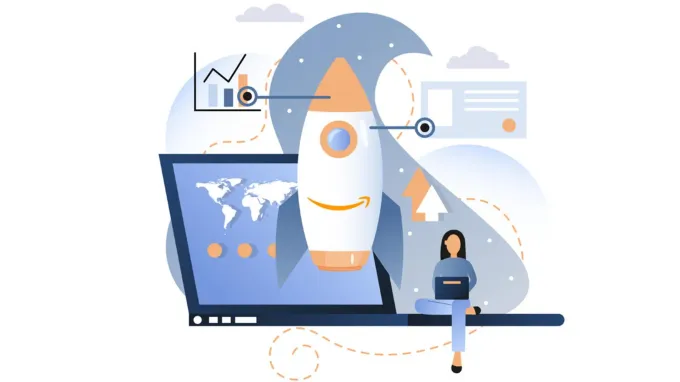AI solutions
What we do
Services
Experts in
How we work
Today, Amazon Web Services (AWS) is the world’s largest cloud computing service provider, servicing 32% of the global cloud infrastructure market. The nearest competitor is Microsoft Azure, with around 22%, followed by Google Cloud. With the rising popularity of a SaaS business model, the importance and market share of cloud services will continue to grow.
What’s the secret to AWS’s popularity? Why is this service so far ahead of its competition? Why have the world’s fastest growing SaaS companies chosen Amazon Web Services to host their websites and applications? Are the alternatives comparable?
Below, we will introduce to you the leader of cloud computing and compare it to other currently available products.
Amazon Web Services (AWS) is a subsidiary of Amazon and mainly focuses on providing infrastructure as a service (IaaS) and platform as a service (PaaS). The technology behind AWS provides users with a virtual cluster of computers that can be accessed from anywhere at any time.
When visiting the Amazon Web Services website, you’ll definitely notice that there are two sections: products and solutions. Although you might be confused at first, there is a significant difference between the two types of services.
AWS Products is a list of different services provided by Amazon. They are divided into several domains, including Compute, Storage, Database, Networking & Content Delivery, Developer Tools, Management Tools, etc. Each domain includes multiple products. For example, among Databases, you will find RDS, Aurora, DynamoDB, Redshift, ElastiCache, and AWS Database Migration Service. These are all designed to solve different problems, so finding the best match for your particular need won’t be an issue.
AWS Solutions are more complex. These are actually sets of products gathered under a single classification to best fit certain types of projects. Big Data, Internet of Things, Scientific Computing, E-Commerce, and other types of applications can use these ready-customized bundles created with the needs of a certain type of app in mind. Industry sectors like Government, Gaming, Healthcare, and Science could also benefit from product bundles.
Amazon Web Services has competitive pricing that makes it extremely attractive for individuals and businesses. The company offers a one-year free tier that includes a certain number of services. Some AWS products are free forever. The world’s best cloud services provider offers 25 GB of storage in DynamoDB, 1 million requests per month in AWS Lambda, 100 million events per month in Amazon Mobile Analytics, and some other resources at no extra cost forever. You can check out all the free Amazon Web Services products here.

12 months after sign-up or after exceeding the predefined amount of services, Amazon Web Services require payment. The prices are highly customizable and remain some of the lowest in the cloud computing market.
AWS follows the “pay-as-you-go” model. This means that you pay only for the actual amount of services you use. There are no subscriptions, no packages, no fees, and no long-term contracts.
One of AWS’s most popular services, EC2 (Elastic Compute Cloud), offers highly flexible pricing. By selecting on-demand instances, you will pay only for the instances that you actually use. The cost of each instance varies from $0.0059 per hour, with the lowest CPU and memory, up to $3.2 per hour with 64 CPU and 256 GB of memory. You can select a plan that best matches your needs and stays within your budget.
Cloud technologies are on the rise, and the number of cloud service providers continues to grow. Today, you need a cloud computing services provider for almost any product you want to develop, from a mobile app or online gaming platform to a SaaS CRM system or blockchain solution. But with so many cloud service providers on the market, why do companies choose Amazon Web Services to host the infrastructure for their websites and apps? There are several compelling reasons for this:
Amazon Web Services offers diverse solutions under one roof. Yes, it is currently number one. However, the market is full of new cloud computing products that have the potential to become (and some of them have already become) a powerful alternative to AWS.
In Clockwise Software, we provide IT outsourcing services and work on many cloud-based applications of different sizes and industries. While AWS remains our preferred cloud provider, we have experience with all the main alternatives as well.
Google Cloud Platform (GCP) enables everyone to use the same infrastructure Google uses for its most popular products (Gmail, YouTube, Google Drive). Providing a wide audience with access to this service, the company is trying to compete with AWS. Similarly, Google Cloud consists of a variety of services, such as Google Compute Engine, Google App Engine, Google Storage, Google Cloud CDN, Google Cloud DNS, and many more.
Let’s take a look at where it can currently beat Amazon:

But there are still points where Amazon Web Services performs better:
Even though Google Cloud Platform solutions aren't as popular as Amazon Web Services, they will continue to develop and grow.
Microsoft’s Azure promotes itself as a cheaper alternative to Amazon Web Services. Indeed, both companies follow a similar approach - offering a variety of cloud-based services under one hood.
Currently, it is hard for Azure to compete with AWS: the cloud computing market share is 22% against 32%. However, their general offer is more attractive:
With comparable service quality and lower costs, Azure hopes to win a part of the AWS audience.

DigitalOcean (DO) is a cloud service platform primarily competing with Amazon’s EC2. Currently, they also have an analog to Load Balancer, S3, and a few other services.
First of all, it is a powerful tool for startups for several reasons:
However, there are several points where AWS clearly beats DigitalOcean:
So, what to choose, AWS or DigitalOcean? AWS is more of a corporate solution as it offers other services that can be installed in a bundle. DigitalOcean attracts clients with lower prices and user-friendliness - even a beginner developer can set up an instance.
Choosing the best cloud platform between these two can be hard. Both AWS and DigitalOcean have their advantages. Generally speaking, DO may fit a startup better than EC2. But the final choice depends on many factors that can be determined in a personal consultation with a professional.
Heroku is another service typically compared with EC2. This is a Platform as a Service (PaaS) solution, making developers’ jobs easier. There’s no need to set up and maintain instances. Everything is available to the user right away.
Heroku is hosted on AWS. This means that you have the stability and reliability of Amazon servers but with the configuration already done for you.
Heroku is somewhat similar to another AWS tool called Elastic Beanstalk, which also offers a ready platform but enables infrastructure configuration if needed.
This is a typical choice for startups and small businesses when time-to-market and minimal budget are critical. Heroku allows you to save time and money while sacrificing flexibility.
This service isn’t an option for performance-heavy applications. When hosting a large app on Heroku, you will experience slow deployment. AWS is a better option for complex software.
In the battle of Elastic Beanstalk vs. Heroku, the win goes to the Amazon product.
Today, 99% of companies use at least one SaaS product in their operations. Software as a service applications are cloud-based, so cloud and SaaS industries are both striving, driving each other’s growth. But how to choose a cloud platform that will perfectly align with your business needs, strategic plans, and tech requirements?
As you can see in this SaaS platform development case, in Clockwise Software, we use AWS to create high-level architecture and ensure scalability for future growth. Well-known SaaS companies such as Netflix, Slack, Lyft, Airbnb, and Adobe also chose Amazon Web Services as their cloud services provider. The main reasons for the popularity of AWS with SaaS development services providers are scalability, robust security measures, and global infrastructure.
By the way, if you are interested in Software as a Service model and want to learn more about this industry, read our article about the main SaaS trends.
Now, you know a lot about Amazon Web Services and its main competitors. Only you can decide which cloud platform is best suited for your needs and requirements. Let’s sum up quickly:
AWS is the one and only leader. If you are seeking quality, reliability, professional support, and community help, and if you are not ready to compromise for the sake of a few hundred dollars - Amazon Web Services is exactly what you need.
DigitalOcean is powerful but works for Linux apps only. It is easy and quick to set up, reducing the development time and costs. This is a good choice for startups.
Heroku is a low-cost solution usually chosen by startups and small businesses. When starting, the choice between Heroku and AWS is obvious, but as your app scales, you’ll have to migrate to a more powerful service provider.
Google Cloud offers a handful of various services. It is a proven provider since it offers the same infrastructure that Google uses for its projects. It’s cheaper than AWS, but also offers less - some services available on AWS can’t be found on GCP yet. In the next few years, we will likely see this competition: Amazon Web Services vs Azure vs Google Cloud
Azure has done its best to challenge Amazon for the title of the best cloud computing platform, offering comparable services for a lower price. Just like AWS and GCP, Azure is a good choice for big projects, since it enables you to configure the infrastructure completely according to the needs of the specific software.
If you are still not sure what cloud platform to choose, there are several ways to get assistance. In case you lack tech expertise in your team, try CTO consulting services or hire dedicated developers with proven experience working with cloud computing.
Choosing a cloud computing service provider is as important as choosing your product’s tech stack or software development partner. While many options are available, AWS remains number one. Azure and Google Cloud are serious contenders but still lack Amazon Web Services’ variety of services and extensive global infrastructure. Every cloud platform has its own advantages and limitations, so carefully consider them and consult with experts to make an informed decision and choose the right provider.
